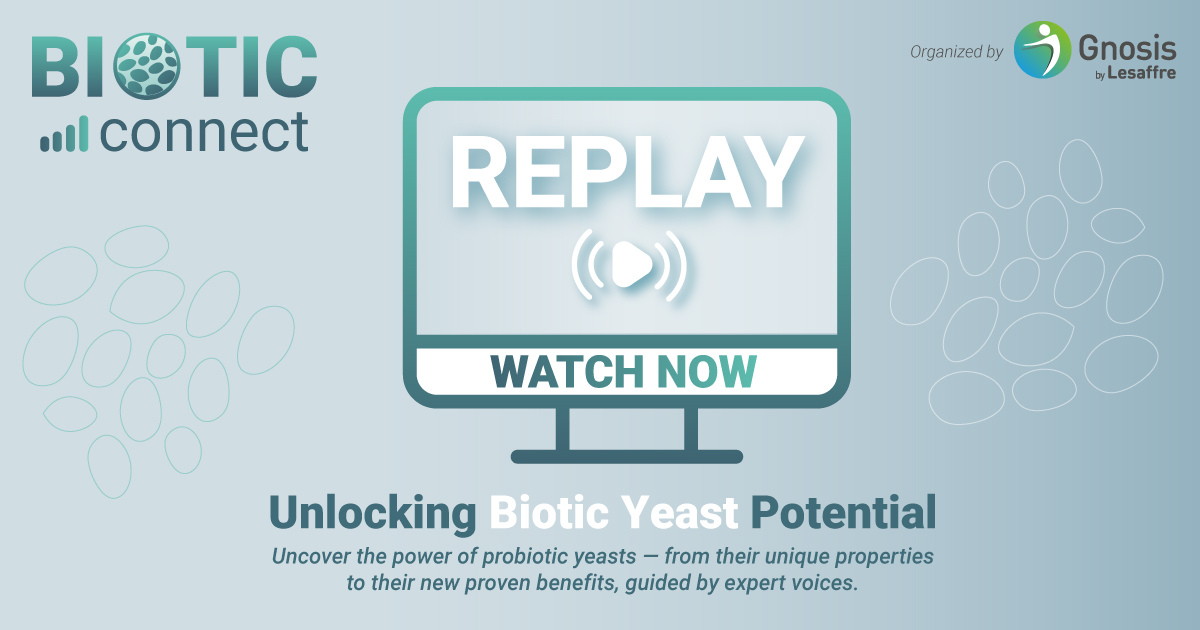
The incidence of Alzheimer’s and dementia is rising leading people to increase their interest in cognitive health.
Why are people prioritizing supporting their cognitive health with dietary supplements?
People are living longer all over the world. In fact, there were 700 million people aged 65 or older in 2019, and that number is expected to increase to over 1.5 billion in 2050. However, as people age, the incidence of Alzheimer’s and dementia is rising. The World Health Organization (WHO) predicts that by 2050 139 million people will be dealing with dementia. Because of this, many people are becoming more interested in preserving their mental sharpness as they age and are seeking out cognitive support supplementation to help. This is creating new opportunities for brands selling dietary supplements and functional foods.
Which ingredient should people look for to support their cognitive health?
There are many different options for cognitive dietary supplement formulation that can help support mental health and well-being. However, with so many brain health supplements entering the market, it can be difficult for brands to stand out. One way for brain health brands to differentiate themselves is by using unique, clinically supported ingredients, – and S-adenosyl-L-methionine (affectionately known as SAMe) is one such ingredient.
SAMe is important for various functions in the human body, including detoxification, regulating genes, mood balancing, and controlling inflammation, because it is a crucial methylating agent.[1,2] Basically, when we talk about SAMe, we’re talking about a methyl-donating cofactor that’s created through a process called one-carbon metabolism or methylation cycle, which involves folate and vitamin B12. [2]
How does SAMe’s methyl donor activity play a role in brain health?
SAMe supports brain health on three fronts:
- SAMe is involved in the synthesis of neurotransmitters dopamine, serotonin, and norepinephrine. These chemicals help regulate our mood, behavior, and overall well-being. Sometimes, when there are dysfunctions in these neurotransmitter systems, people can develop depression or other mood disorders. However, taking SAMe supplements can promote increased synthesis of these neurotransmitters, which may help balance mood and enhance overall well-being.[3]
- SAMe plays a role in forming myelin, which is like a protective covering around the axons of your neurons. This covering helps keep your neurons healthy and functioning properly. Additionally, SAMe can improve the fluidity of your brain-cell membranes, which is important for the smooth functioning of neuroreceptors. Overall, taking SAMe supplements can help improve the health and function of your brain cells. [4]
- When you take SAMe, your body can produce an important antioxidant called glutathione. This is also known as the “master antioxidant” because it’s so powerful. Glutathione works by getting rid of free radicals that can cause oxidative stress and damage your brain. By taking SAMe, you can help keep your brain healthy and free from damage caused by these free radicals. [5]
What happens to SAMe levels as people age?
As you get older, your levels of SAMe and methylation start to decrease, which can slow the important activities that SAMe is responsible for in your body.[6] That’s why taking SAMe supplements can help support your mood, brain function, and overall neuronal health. It may even help reduce the risk of the onset of developing cognitive health problems, according to Nutraceuticals in Health and Disease Prevention.[7]
SAMe is an effective option for supporting mood and promoting mental well-being as we age. According to medical advice, it can be used alone or with other antidepressants.[8]
What else contributes to the methylation cycle?
Folate and Glutathione are two other important factors in the methylation cycle that also play a fundamental role in cognitive health. Folate, which is also known as 5-MTHF, is the biologically active form of folic acid that your body can use immediately, even if you have enzyme issues. Together with B12, folate helps convert homocysteine into methionine, which then becomes SAMe as part of the methylation cycle.[9,10] By supporting this process, Folate and B12 help ensure that your brain is healthy and functioning at its best.
Folate is a key nutrient that your body needs to keep your brain working at its best. It can even help with mild cognitive issues by reducing your levels of homocysteine, which can be a big driver of cognitive dysfunction.[11]
On top of that, Glutathione is another important player in cognitive health. It’s an amazing antioxidant that helps protect your brain from oxidative stress and damage caused by free radicals. You need to have enough glutathione in your body to keep your brain healthy and functioning properly, especially when it comes to memory.[12] But sometimes things like stress, infections, and getting older can deplete your body’s stores of Glutathione. That’s why taking supplements to boost your levels can really help you maintain good cognitive health and function at your best.[13]
Ingredients mentioned

Quatrefolic®
Active ingredients
Folate: An innovative dietary ingredient designed to act as a nutrient in all areas where folic acid and folate supplementation is recommended and allowed.
Reproduction & Women’s
Wellness & Immune
Mobility & Joint
Fertility
 Pregnancy
Pregnancy Menopause
Menopause

Adonat®
Active ingredients
SAMe (S-adenosyl-L-methionine): The leading brand of S-Adenosyl-L-methionine (SAMe), a compound produced naturally by the body that is required for proper brain functioning. SAMe is involved in more than one hundred biochemical pathways and it has been shown to have benefits for the mood, liver, joints, and more.
Mood & Cognitive
Mobility & Joint
Digestion & Gut
 Mood
Mood Cognition
Cognition Stress & Anxiety
Stress & Anxiety

Emothion®
Active ingredients
Glutathione: The crystalline form of S-Acetyl Glutathione (GSH) is a powerful antioxidant that can help promote skin health, liver health, and more by naturally replenishing glutathione level.
Wellness & Immune
Mood & Cognitive
Digestion & Gut
Antioxidant
Beauty
 Cognition
Cognition
Latest news & videos

- News
- Quatrefolic®
- Wellness & Immune
- Jun 12, 2025
Webinar Rethinking Women’s Health 24 June 2025
Women's health is complex, constantly evolving, and a broader perspective is long overdue, one...

- News
- Quatrefolic®
- Wellness & Immune
- Jun 09, 2025
Gnosis by Lesaffre Highlights Quatrefolic® at New Nutrition Forum in Hangzhou, China
Gnosis by Lesaffre was proud to serve as the Title Sponsor of the New...

- Corporate
- Digestion & Gut
- News
- Jun 06, 2025
Biotic Live: A Successful First Edition Exploring the Power of Probiotic Yeasts
Gnosis by Lesaffre recently hosted the first edition of Biotic Live, a unique event...
Learn more about
References:
- Gao J et al. “S-Adenosyl Methionine and Transmethylation Pathways in Neuropsychiatric Diseases Throughout Life.” Neurotherapeutics. 2018;15(1):156-175.
- Bottiglieri T. “S-Adenosyl-L-methionine (SAMe): from the bench to the bedside—molecular basis of a pleiotrophic molecule.” Am J Clin Nutr. 2002;76(5):1151S-1157S.
- Mischoulon D and Fava M. “Role of S-adenosyl-L-methionine in the treatment of depression: a review of the evidence.” Am J Clin Nutr. 2002;76(5):1158S-1161S.
- Lieber CS and Packer L. “S-Adenosylmethionine: molecular, biological, and clinical aspects–an introduction.” Am J Clin Nutr. 2002;76(5):1148S-1150S.
- Cavallaro,RA et al. “S-adenosylmethionine prevents oxidative stress and modulates glutathione metabolism in TgCRND8 mice fed a B-vitamin deficient diet.” J Alzheimers Dis. 2010;20.4:997-1002.
- Agrawal A et al. “Age-associated epigenetic modifications in human DNA increase its immunogenicity.” Aging (Albany NY). 2010;2(2):93-100.
- Adapted from “Nutraceuticals in Health and Disease Prevention”, (Chapter 3, “S-Adenosylmethionine (SAMe): Preclinical and Clinical Studies in Depression”. Bottiglieri T, Baylor Institute of Metabolic Disease). Edited by K Kramer, P-P Hoppe, and L Packer, 2001.
- Sharma A et al. “S-Adenosylmethionine (SAMe) for Neuropsychiatric Disorders: A Clinician-Oriented Review of Research.” J Clin Psychiatry. 2017;78(6):e656-e667.
- Kelly CB et al. “The MTHFR C677T polymorphism is associated with depressive episodes in patients from Northern Ireland.” J Psychopharmacol. 2004;18(4):567-571.
- Gilbody S et al. “Methylenetetrahydrofolate Reductase (MTHFR) Genetic Polymorphisms and Psychiatric Disorders: A HuGE Review.” Am J Epidemiol. 2007;165(1):1-13.
- Ginsberg LD et al. “L-methylfolate Plus SSRI or SNRI from Treatment Initiation Compared to SSRI or SNRI Monotherapy in a Major Depressive Episode.” Innov Clin Neurosci. 2011;8(1):19-28.
- Marí M et al. “Mitochondrial glutathione, a key survival antioxidant.” Antioxid Redox Signal. 2009;11(11):2685-2700.
- Dwivedi D et al. “Glutathione in Brain: Overview of Its Conformations, Functions, Biochemical Characteristics, Quantitation and Potential Therapeutic Role in Brain Disorders.” Neurochem Res. 2020;45:1461-1480.





